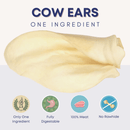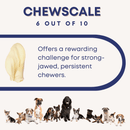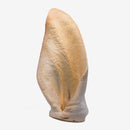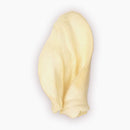Description
Cow ears are a natural snack for dogs made from the dried cow ear.
Cow ears are one of the most popular dog chews because they contain protein, they help promote digestion and teeth cleaning.
They also have less fat than other animal products like pig ears or beef jerky, making them a healthier option for dogs who need to lose weight.
Cow ears can also be given as an alternative to rawhide chews because they're made up mostly of cartilage, which is soft and won't splinter.
Cow ears come in various sizes mainly because every animal is different in terms of size and anatomy.
What are the benefits of Cow Ears for Dogs?
Is your dog always begging for a treat? Do you want to give them something that is both healthy and satisfying? Cow ears might be the perfect solution!
Not only are they a great source of protein, but they are also low in fat and calories. Plus, they are easy for dogs to digest. Here are four reasons why cow ears make an excellent snack for dogs.
PROTEIN
Protein is an essential nutrient that dogs need to stay healthy and happy. Cow ears are a great source of protein because they contain approximately 26.30% in every single ear.
It makes them an excellent treat for dogs who are active or working hard to lose weight. Protein is also essential for muscle growth, so it's necessary that your dog has access to this nutrient on a regular basis.
Cow ears are an excellent source of protein and can help keep your dog feeling full. These Treats are low in fat and easy to digest, meaning that your dog can get all of the protein they need without feeling weighed down.
OMEGA-3 FATTY ACIDS
Omega-3 fatty acids are something humans regularly supplement their diets with because our bodies cannot produce them on their own. While dogs aren't deficient in omega-3 fatty acids, they can benefit from the nutrients in cow ears.
They help with cardiovascular health and, according to some studies, may even fight cancer! In addition to omega-3 fatty acids, these treats also contain Omega-6 fatty acids, which have been linked to healthier coats.
Cow ears are a great source of Omega-3 and Omega-6 fatty acids. These fatty acids are essential for your dog's cardiovascular health and may also provide anti-inflammatory benefits!
LOW IN CALORIES
Cow ears are a pretty healthy treat to give your dog because they're low in fat and calories: each ear has 40 calories, making them a great option if you're trying to get your pup to slim down.
If you have a dog who needs to lose weight but still requires some extra nutrients, cow ears are an excellent choice because they're high in protein without being packed with calories.
Cow ears are low in calories and fat, which makes them an excellent treat for dogs on diet plans. If your pup is trying to slim down or get more fit, cow ears are a great option because they're healthy, low in fat and calories, and high in protein.
EASILY DIGESTED
Dogs need to chew on things in order to help their jaws stay strong, but sometimes chewing can wear down their pearly whites.
If you want your dog to have something tasty to chew on but don't want it to hurt their smile, cow ears are a great choice.
They're made of hard cartilage and are easily digestible, which means they are perfect for pups who can't chew anything tougher.
Cow ears are easy to digest quickly, making them an excellent treat for dogs who have dental problems or trouble chewing other dog treats.
However, Cow ears are a great source of protein, omega fatty acids, and minerals like zinc and selenium. They can help keep your dog's teeth clean and healthy. Cow ears are a natural and healthy snack for dogs. Cow ears come in a variety of flavors that dogs love.
Nutritional Value of Cow Ears
Cow ears are a type of animal ear that is typically used for food. They are made from the flesh of cows and are high in protein and other nutrients.
Cow Ears Are High in Protein
As mentioned above, Cow ears are high in protein, which is essential for building muscle mass and maintaining a healthy weight. They also contain essential fatty acids such as omega-three fatty acids that can help prevent inflammation throughout the body.
Cow ears have been shown to be beneficial for dogs with arthritis because they provide relief from pain caused by joint problems.
Cow Ears are a Good Source of Vitamins and Minerals
Cow ears are also a good source of vitamins and minerals, including zinc, iron, and magnesium. They contain more calcium than most other dog treats, making them ideal for dogs that need extra support for their bones and joints.
Lastly, they are low in calories and carbohydrates, making them a healthy snack choice for dogs on a diet.
Cow ears are not only good for dogs, but they are also a healthy and affordable alternative to other snacks.
Are Cow Ears Rawhide?
There are many different types of rawhide chews available for dogs, but not all of them are created equal. Many people are confused about whether or not cow ears are rawhide. It is essential to know that cow ears are not rawhide but are still a high-quality option for dogs to chew on.
Cow ears are not rawhide. Rawhide is made from the hide of an animal, typically a cow or pig. Rawhide is a type of animal skin that has been dried and processed into thin strips. It is often given to dogs as a chew toy because it is both tasty and durable, but there are concerns when it comes to digestion and long term health risks. Cow ears are made up of cartilage that has been dried out via a manufacturing process similar to jerky before being packaged as treats for dogs to chew on.
These types of chews tend to be more expensive than rawhides chews because they last longer.
Cow ears are a more natural, and less processed, where they're made from a cow's ear rather than a piece of rawhide.
Differences Between Cow Ears vs. Rawhide Chew
Many dogs enjoy chewing to relieve their boredom, but have you ever noticed that some of your pups have a preference for cow ears over other types of chews? Cow ears are generally considered a better alternative to rawhide chews because they are more easy for your dog to digest and don’t tend to be as tough.
Because rawhides are harder and tougher than cow ears, they are also more likely to cause broken teeth and mouth damage.
Cow ears can be a great alternative to rawhide because they don't contain any preservatives or artificial ingredients.
Rawhides tend to be harder on a dog's teeth than cow ears do because they're made from the outer layer of an animal's hide. In contrast, cow ear cartilage is softer due to its composition as collagen and elastin.
Reasons, why people choose to use cow ears as a chew for their dog instead of rawhide, are because they are beneficial in the following ways:
- Cow ears are made of natural ingredients, unlike rawhide chews.
- Cow ears are not produced using harmful chemicals as rawhide chews do.
- They can be used with any food or treat that is safe for dogs.
If you're looking for an alternative to rawhide chews, then a cow ear might be a great alternative.
Should I give my dog cow ears?
Cow ears are generally safe for dogs of all sizes and breeds to consume as they are digestible chews. As your dog chews on the ear, it will disintegrate. However, it is recommended that you remove them from your dog when they become small enough to be swallowed whole to prevent any choking hazards.
Can I give my dog a cow ear daily?
It's crucial to keep in mind that even though cow ears for dogs are low-fat, they still contain calories. It's easy to get carried away with treating our furry friends, but over-indulging can lead to unwanted weight gain and potential health issues. In my opinion, cow ears should be given as an occasional treat and should be a part of a balanced diet, rather than a daily snack. To maintain your dog's healthy weight and overall well-being, it's recommended to limit cow ears to no more than several times a week. Remember, moderation is key when it comes to treating your furry best friend.
How to Incorporate Them Into Your Dog's Diet
There are many ways to incorporate cow ears into your dog's diet. Here are a few ideas:
If your dog is used to getting treats in the morning, try giving them a cow ear as a breakfast snack. This will help provide them with energy for the day ahead.
If your dog loves chewing on bones, try substituting a cow ear for their normal bone. Not only will they love the taste, but they will also enjoy having something new to chew on!
You can even make homemade dog treats using cow ears as an ingredient. Some people like to mix them up with peanut butter, oatmeal flour, and other ingredients that dogs love, such as coconut oil or pumpkin puree.
Do cow ears splinter?
Cow ears are considered a safe and digestible chew for dogs because they are mainly made out of cartilage, which is a flexible and tough material that doesn't splinter easily. However, there is still a possibility that they may break into small pieces, which could pose a choking hazard or cause other digestive issues. While cow ears will not splinter compared to other animal bones or chews, it's still important to monitor your dog while they are chewing on the cow ear and remove it once it becomes small enough to be a choking hazard.
Downsides & Risks of Cow Ears for Dogs
There are a few downsides and risks associated with cow ears for dogs. One is that they can be pretty messy. They tend to stain carpets and furniture, so it's essential to keep an eye on your dog while they are chewing on them.
Another downside is that some dogs may become obsessive about cow ears and start begging for them constantly. If you notice this happening, it's best to cut back on how often your dog is allowed access, or else they may become dependent and refuse other treats too!
Regular vs Jumbo
The difference between the regular and the jumbo cow ears is that the jumbo cow ears are 7 inches or over.
Final Thoughts
Cow ears are rich in protein and amino acids which give your dog's coat a shiny sheen. They can also help to promote long-term dental health by removing plaque and tartar.
Cow ears are a natural chew that can help satisfy your pup's chewing instincts. Rawhide chews are made from the hide of an animal that is boiled to produce a long strip of chewable material.











